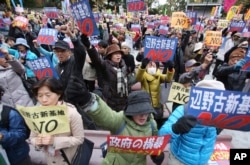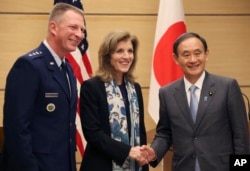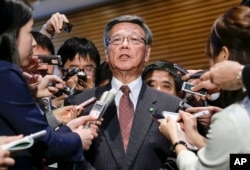Japan’s Prime Minister Shinzo Abe will raise the issue of crimes committed by workers from U.S. military bases in a meeting with President Barack Obama late Wednesday ahead of the Group of Seven summit, according to officials of both governments.
The item has been hurriedly tacked on to the bilateral discussion following the arrest last Thursday of a former U.S. Marine in connection with the April 28 killing of a 20-year-old Japanese woman.
The young woman’s death has brought back memories of the 1995 rape of Japanese schoolgirls by U.S. military personnel on Okinawa, which triggered huge demonstrations there against the American bases.
The crime could become a further impediment to Abe’s push to relocate a U.S. Marine Corps air station to another part of Okinawa’s main island, a move which already has been facing significant local opposition.
The Abe-Obama meeting is seen as unlikely to soothe many Okinawans.
“My sense is that they’re just doing it for show as a reaction to calm down the situation in Okinawa,” said Masaaki Gabe, professor of international relations at the University of the Ryukyus.
“If Obama meets the people of Okinawa it’ll have more impact for the Okinawans,” similar to the U.S. president’s planned meeting Thursday with atomic bomb victims in Hiroshima, Gabe told VOA.
“I don’t expect anything” to come out of the Abe-Obama exchange about Okinawa remarked Gabe, but he added he looks forward to reading his newspaper Thursday morning “to see what kind of discussion they had.”
Okinawa’s governor, Takeshi Onaga, has been rebuffed by the central government after he requested to meet this week with the U.S. president.
“We think that issues related to security and diplomacy should be discussed between the central governments of countries involved,” said chief cabinet secretary Yoshihide Suga in Tokyo.
Ambassador Kennedy visit
U.S. Ambassador Caroline Kennedy is planning to visit Okinawa for talks with Governor Onaga, according to Japanese government officials quoted by local media.
The governor, who has repeatedly stated that Okinawa is unfairly burdened with the bulk of U.S. military installations in the country, is calling for a “drastic review” of the Status of Forces Agreement (SOFA) between Tokyo and Washington which governs the presence of American military personnel in Japan.
“The issues or the concerns that the government of Japan has with the SOFA can be addressed in implementation of the SOFA, rather than a wholesale revision,” Pentagon spokesman Jeff Davis said on Monday. “We’ll continue to do that going forward.”
U.S. Defense Secretary Ash Carter has called his counterpart in Tokyo, defense minister Gen Nakatani, to convey “his sadness and his regret,” about the killing of the Japanese woman, according to a Pentagon statement.
Terse words
Nakatani, according to Japanese media, replied that "the occurrence of an extremely brutal and atrocious incident through a despicable act is abominable and extremely regrettable."
Nakatani reportedly told Carter that efforts should be made to prevent a recurrence and to heighten discipline of Americans in uniform and the civilian workers on U.S. bases in Japan.
There are 53,000 U.S. military personnel based in Japan plus 43,000 family dependents, and 5,000 Department of Defense civilian employees.
Fifteen of the 23 American bases in Japan are located in Okinawa, which was occupied by the United States from the time of Japan’s World War Two defeat in 1945 until 1972. The Okinawa bases encompass about 10 percent of the total land of the southern prefecture, which is a chain of semi-tropical islands.










